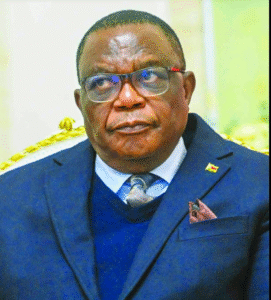CAN AN ILLEGITIMATE PRESIDENT APPOINT A COMPETENT MINISTER OF FINANCE?
Can a president who came to power through a military-assisted coup, following internal factional struggles within his party, and who has remained in power through disputed, rigged elections, genuinely appoint a capable Minister of Finance to rescue a country on the brink of collapse?
This is the question troubling politically informed Zimbabweans — those who are aware of the ongoing erosion of the rule of law, the destruction of institutions, and the slow but steady collapse of the state under the weight of ZANU PF’s decades-long rule. The same cannot be said for much of the rural electorate, who, trapped in poverty and dependence, rely on politicized food aid and remain shielded from the realities of governance, policy, and national mismanagement.
The current government is bloated with ministries, most of which are redundant, heavily militarized, and politicized. These ministries exist not to serve the people, but to protect the interests of a regime determined to hold on to power at all costs. These institutions, which should be independent, have instead become arms of a regime that continues to suffocate any real chance of reform — let alone economic revival.
Expecting a truly professional, reform-oriented Minister of Finance to emerge from such an illegitimate and dysfunctional system is naïve at best. Why would a president whose survival depends on patronage and unchecked access to public resources appoint someone who might challenge the very networks that prop him up? Real economic reform requires cutting waste, ending corruption, and restoring the independence of institutions like the Reserve Bank, the judiciary, and the Zimbabwe Revenue Authority — all of which have been compromised by political capture.
A genuinely competent Finance Minister would not tolerate the misuse of public funds to maintain the loyalty of a bloated and compromised security sector, or the politicization of state media, the judiciary, and prosecuting authorities. Such a minister would also not allow public contracts to be used as tools of political reward or manipulation. But this is exactly what keeps ZANU PF alive — a web of loyalty, maintained through looting, suppression, and control.
We saw, during the short-lived Government of National Unity (GNU), how much progress is possible when technocrats are allowed to lead. With the opposition in charge of the Finance Ministry then, the economy showed signs of recovery. Inflation was controlled, public service delivery improved, and donor confidence returned. But ZANU PF viewed this progress not as a model for future governance, but as a threat to their grip on power.
This brings us to the current Minister of Finance, who was once praised as a capable technocrat. However, his decision to contest elections under the ZANU PF banner raises serious questions about his independence and credibility. A true technocrat, committed to national recovery and reform, would not align with a party known for undermining constitutionalism, promoting corruption, and sustaining a culture of impunity.
In the end, a competent Minister of Finance cannot thrive under an illegitimate regime. The moment reform begins to threaten the status quo — to limit the looting, to introduce meritocracy, or to challenge power networks — that minister becomes a liability. This is why economic mismanagement is not a mistake in Zimbabwe; it is a strategy for political survival.
Until Zimbabwe has a legitimate government that is accountable to its people, led by a leadership that respects the constitution, institutions, and the rule of law, any so-called reformist in the Finance Ministry will be no more than a figurehead — tolerated as long as they don’t interfere with the real business of politics: power, protection, and plunder.



